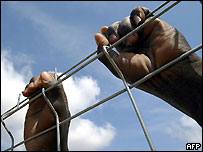 After much discussion between the Nigerian and Moroccan governments and as a continuation of her efforts to halt migration of her workforce to Spain through North African countries, Nigeria has concluded plans to effect the deportation of about 6,000 of her nationals illegally residing in Morocco.
After much discussion between the Nigerian and Moroccan governments and as a continuation of her efforts to halt migration of her workforce to Spain through North African countries, Nigeria has concluded plans to effect the deportation of about 6,000 of her nationals illegally residing in Morocco.The country has also instigated a move to collaborate with Morocco and Spain to rehabilitate the illegal migrants.
Last year, the Federal Government working in tandem with the Moroccan authorities, successfully brought back 250 voluntary returnees. Many would-be migrants die on the coast and inside countries like Libya or attempting to cross the Mediterranean on rafts to Italy.
The Moroccan Ambassador to Nigeria, Mustapha Cherqaoui, said in agreeing to the tripartite arrangement in which France is also now involved, the countries were merely trying to stay on top of the human drift before it became totally uncontrollable.
Last October when the illegal influx of humans from Nigeria reached a head and worsened the image problem of the country, the countries decided to adopt a global approach towards solving the problem after reaching an agreement to the effect that a multilateral framework of interception, rehabilitation and dignified return would work best.
Nigeria is a member of the steering committee of the Euro-African. The global approach developed now to fix this enigmatic human problem involves the European commission, Spain, France, Belgium, Germany, Italy, UK, Finland, Portugal and Austria-all receiving countries.
On the African side, the countries in the collaborative partnership are Nigeria, Morocco, Tunisia, Libya, Mauritania, Algeria, Mali, Niger, Cote D'Ivoire and Congo. Algeria withdrew from the steering committee meeting at the last moment without offering any explanation.
Morocco occupies a strategic position in the battle against illegal immigrants who most often prefer the strait of Gibraltar as their conduit into Europe. The country is both a source of origin of migrants, a transit point and also a destination, the ambassador disclosed in Abuja.
Ambassador Cherqaoui said: "The new effort now is meant to fashion out concrete solutions to the problem and help the transit countries to face the peculiar challenge, help integrate the migrants who are there (Morocco) already. It's a dynamic that we are developing right now. By virtue of our position in the transit map, we are in a special dilemma but the important thing is that with the cooperation of Nigeria, we want to help those who seek to come back."
On the things the Nigerian government must do to stem the tide and insulate the country from international embarrassment, he said "it is not up to only one government. There needs to be enough developmental projects that will bring out the best in the youth in your country. Then good governance and jobs. Once their standard of living is commensurably high, your people will prefer to stay at home with their families rather than face risks abroad."
Tags: Morocco Fes, Maghreb news

No comments:
Post a Comment